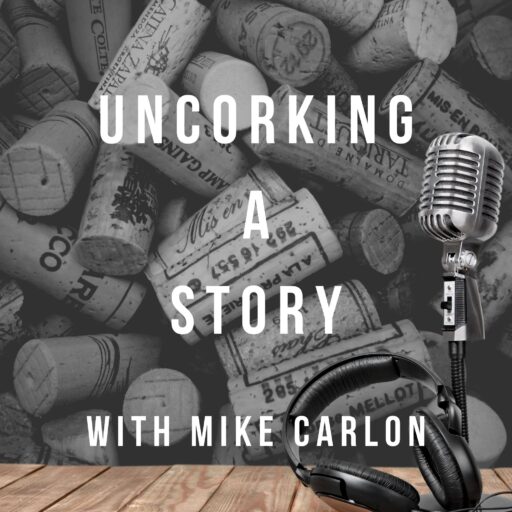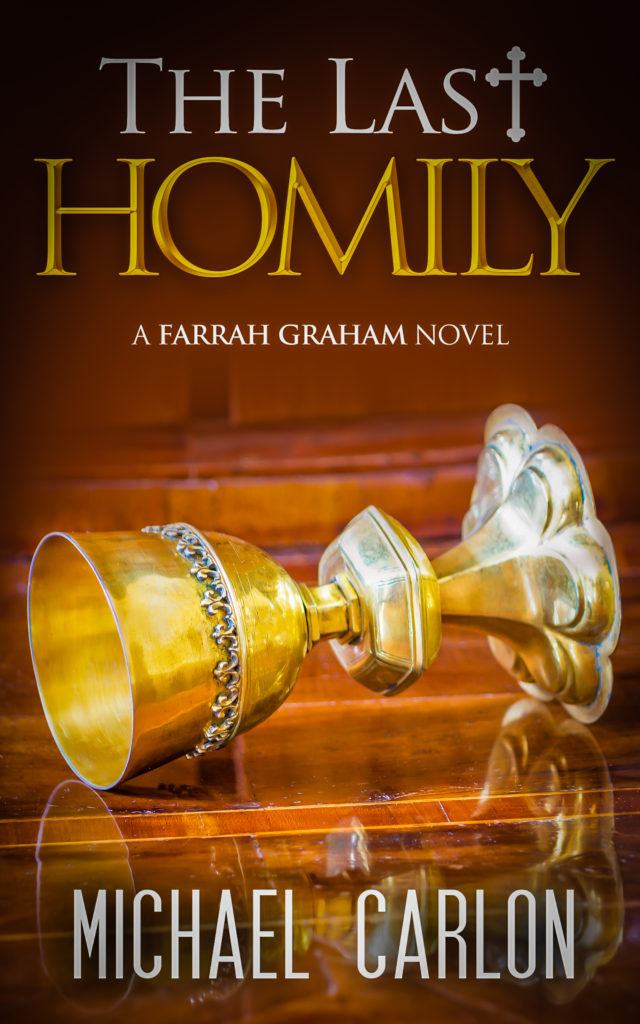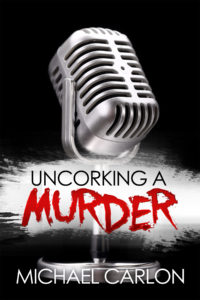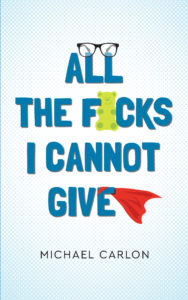The Last Homily
A progressive priest is murdered on the altar and it’s up to Farrah Graham to find out who did it, and why.
A Catholic priest is murdered while celebrating mass in the resort village of Chatham, MA and it is up to Farrah Graham, host of the Uncorking a Murder podcast, to find out who did it and why, before the killer strikes again.
Father Gregory Hart is an outspoken reformer in the Catholic Church and has been a thorn in the side of church hierarchy ever since the sex abuse scandal broke in 2001. In his homilies, Fr. Hart has advocated for the ordination of women, the welcoming of homosexual couples into union with the Church, and the reversal of his Church’s stance on artificial birth control. One Sunday, Fr. Hart drops dead on the altar just before the end of mass and his congregation is shocked to find out that he was murdered.
Farrah Graham, host of the Uncorking a Murder podcast, sees the priest die and immediately inserts herself into the case. When a sexual abuse survivor is arrested for the murder of Fr. Hart, Farrah has her doubts about his guilt and launches her own investigation. As her exploration proceeds, it becomes clear that the police have arrested the wrong man and this puts Farrah, her brother Michael, and “Jimmy Doubts,” in harm’s way as the real killer will stop at nothing to hide from justice.
Amazon Review
Amazon Review
Amazon Review
CHARACTERS
Farrah Graham
Host of the Uncorking a Murder podcast. She’s vacationing in Cape Cod when she sees a priest die while saying Mass.
Fr. Gregory Hart
A progressive priest who is murdered while saying mass.
Fr. Peter Cossa
Extremely conservative priest at odds with Fr. Hart’s progressive values.
Jimmy Doubts
A law school student and Farrah’s former intern. He’s convinced to abandon his summer internship to help her with a case.
Bishop Robert Hurley
Bishop of the diocese of Fall River, MA.
Detective William Nickerson
Lead investigator into the death of Fr. Gregory Hart.
Chapter 1
Father Gregory Hart looked at the congregation assembled in front of him and mentally separated his flock into three different categories: those who liked him, those who hated him, and those who were still making up their minds. He was a reformer in every sense of the word, and the homily he was about to preach would certainly underscore that.
Six months ago Fr. Hart was assigned to Our Lady of Healing Church in the resort community of Chatham, Massachusetts, by the bishop of the Diocese of Fall River, Robert Hurley. Though in Fr. Hart‘s mind, he was more banished than assigned — even if he clearly understood why the bishop sent him to the Cape.
Chatham is located on the elbow of Cape Cod; it wasn‘t exactly where an idealistic priest wanted to go in order to set the world on fire with his preaching. While between Memorial Day and Labor Day the town was flooded with families looking to take a break from the stresses of daily life, during the other nine months of the year, the town was, for lack of a better term, dead — not the place for a priest looking to change the face of Catholicism in the United States.
Fr. Hart had been a thorn in the side of Church hierarchy ever since the sexual abuse scandal broke fifteen years ago. He publicly advocated for the excommunication of any priest who was convicted of abusing a child, but his vitriol didn‘t end there. He was also outspoken in his steadfast belief that higher ups in the Church should have their feet held to the fire for their role in covering up abuse — a fight he took to both press and pulpit.
These days, with the sexual abuse scandal farther in the rearview mirror, the impresario priest had taken to speaking out on his beliefs that homosexual couples should be welcomed into full union with the Church, clergy should be able to marry, and women should be allowed ordination into the priesthood.
Bishop Hurley was pressured by his peers and superiors to do something about the controversial priest in his diocese, and therefore had him assigned to a series of positions at parishes in Fall River that most clergy would deem undesirable, either due to their size or aging population, but this did nothing to put out the fire that was ablaze inside his problem priest. When the need for a new pastor for a small church in the town of Chatham came up, Fr. Hart’s name was on top of Bishop Hurley’s list. The bishop knew he couldn’t completely silence his problem child, but placing him in a small church on the outskirts of Massachusetts would surely help to police his reach.
However, the plan wasn‘t working. While the fiery Fr. Hart was speaking to a much smaller population in the small town of Chatham, he had taken to recording his homilies and distributing them as free podcasts that could be downloaded from the Internet. He had tens of thousands of followers on social media and was a frequent contributor to blogs that welcomed a voice of reform in the Church.
Fr. Hart left the ambo where he had just finished reading the Gospel and walked to the center aisle of the church where he preferred to preach his homilies. Before starting to speak, he reached under his clerical robes to turn on both his wireless microphone and the digital audio recorder he used to capture each of his homilies. He looked up and smiled at the congregation assembled that Sunday morning. He was about to preach a homily reflecting on the story of the Prodigal Son — a parable Jesus used to teach his followers about the nature of forgiveness.
“Who here identifies with the prodigal son we heard about in today‘s Gospel reading?” Fr. Hart‘s confident voice boomed throughout the small church. He typically started his homilies off with a question as a way of making them more interactive. He saw a few people smiling and nodding their heads and then continued, “Some of you may have a hard time believing this, but when I was younger, I was a bit of a rebel. I lived lavishly and spent money as soon as quickly as I earned it.”
Before becoming a priest, Greg Hart had worked in the financial services industry and lived the unrestrained lifestyle of a young investment banker in Boston. He was a handsome man, and the women of the parish remarked how he resembled to Jared Leto. One in particular gave him the nickname “Father What-a-Waste,” referring to the Church‘s requirement that its priests be celibate.
“So in my younger years, I absolutely identified with the prodigal son. But depending on what I have going on in my life when I reflect on this passage, I find that I relate to other characters more so than I do with the son. Who are some of the other characters in the story?”
“The father,” shouted out a parishioner.
“Excellent!” Fr. Hart exclaimed. “There would be no story without him, would there? He‘s the one with the money the prodigal son asks for. Imagine the pain and disappointment he must have felt when his son left home with his early inheritance; in some ways the prodigal son asking for his inheritance early could have been a way of wishing a premature death upon his father. Ouch!”
This led to a few laughs from the assembled congregation.
“Imagine the sadness the father must have felt when he learned his son was poor and destitute. And this, of course, is counterbalanced by the joy he felt upon his son‘s return home. He‘s a very important character, but he‘s not the one I relate to more today. Name another character,” Fr. Hart challenged his congregation.
“The pigs,” a young boy shouted out. This caused others in the congregation to laugh, including Fr. Hart.
“I‘ve been a priest for over fifteen years, and this is the first time I have heard someone mention the pigs in the story. But you do have a point; we have to remember that the Jewish crowds Jesus was preaching to at the time would find it abhorrent that the prodigal son would have been working with animals that our Jewish brothers and sisters then, as now, considered unclean. The presence of pigs is important to the parable because the thought of working with swine conveyed how down and out the prodigal son really was. But it‘s not the pigs who I relate to today.” Fr. Hart walked toward the kid who answered his question and gave him a high five. “Okay, one last chance — name another character in the story.”
“The brother,” answered Emily Rose, a fifty-two-year-old single woman who was sitting in the front row of the church because she was serving the Mass as a Eucharistic Minister that day. She was dressed conservatively in a blue skirt and matching jacket and wore a veil over her head to signify her humility, submissiveness, and obedience to the Church. It was a practice that went out with the reforms of the second Vatican Council in the late 1960s, but one she did not shed.
“Yes, the brother!” exclaimed Fr. Hart. “The man who does not feel the excitement of his father upon his own brother‘s return but rather is filled with anger and jealousy. Today, I relate more toward the brother than the other characters. Here‘s a guy who has done everything right his entire life, yet his brother not only gets an early inheritance, but then he gets a party thrown for him after he comes back having spent it on women and wine. Who wouldn‘t be upset by that?”
Fr. Hart was conscious that this particular homily did not yet include one of his trademark jabs at the Catholic establishment, and he didn’t want to disappoint any of the fans who would be downloading his homily later on. “As much as we want to place ourselves in the shoes of the welcoming father, the fact of the matter is most of us will have a very hard time doing so – just look within your own families for proof. Certainly some of you have been wronged by your parents. Have you forgiven them for any harm they may have caused you? Or maybe you have a brother or sister who hurt you at some point — have you offered them forgiveness even if it has not been asked for? Maybe you have a son or daughter that hurt you in ways that only your children can. Was forgiveness granted to them?”
Fr. Hart let these words sink in and then drove the point home. “And more often than not, the Church assumes the role of the forgiving father in the story when, in reality, it behaves more like the jealous brother. There are people that our Church has historically turned away and continues to turn away — homosexuals and the divorced, just to name a few. Oftentimes, the Church feels as if these marginalized groups are the prodigal son who should be seeking forgiveness, but the fact of the matter is that we as a Church have to humble ourselves and ask for compassion from those whom we have historically oppressed.”
Father Hart paused to look over the faces of his congregation and saw some who were smiling, some who were clearly irritated, and some who wore no expression whatsoever. To signify that he had finished preaching, he said, “Let us now stand to profess our faith,” and the congregation rose and recited the Profession of Faith.
***
Farrah Graham, the creator and host of the Uncorking a Murder podcast, was in the congregation that morning. Many vacationers in the town of Chatham mistook her for Gwyneth Paltrow, and she had been hit on by just about every single guy in town. These gentlemen, however, were shocked to find that Farrah was in a committed relationship with another woman, Melody Note, who was sitting beside her in the pew that morning.
The two were vacationing in Chatham after having spent a year researching, recording, and producing Uncorking a Murder‘s second season, which focused on a case in South Florida involving Sonny Michaels, a man who was wrongly convicted for the death of his wife. Farrah‘s investigation into that case led to Sonny‘s release from a Florida prison, and she had just spent the past six weeks on a national media tour to promote the podcast. In short, she was burned out and had promised Melody she would take the summer off and spend it at their beach house on Cape Cod.
Melody was skeptical that Farrah would follow through with this plan; Farrah was a workaholic who once worked eighty-hour weeks at a prestigious law firm in Manhattan. When Melody gave her an ultimatum of “the job or me,” Farrah resigned her partnership in the law firm, and the two moved out of the city into the town of Stamford, Connecticut.
Things were going great until Farrah read a book about Brandon Nash, a famous football player and actor who was convicted of murdering his wife. Farrah could not help but believe that she could have done a better job than the book‘s author at investigating the case, and she decided to start her own investigation as a hobby. Since Melody was a radio producer, the two hatched the idea that Farrah‘s findings could be distributed as a podcast.
Farrah had a knack for storytelling, evidenced in the first season of Uncorking a Murder, which had been described by one reviewer as a “delicious throwback to an old-fashioned radio drama.” The contradiction wasn‘t lost on Farrah; in a sense she had produced something that would have been popular in the 1930s but required someone to listen to it on devices made in the twenty-first century.
The podcast was an instant success, and the millions of downloads led to a significant amount of advertising revenue, but along with ad dollars came pressure to repeat its success. Last year, Farrah‘s intern Jimmy Rella,(nicknamed Jimmy Doubts due to his nervous tendencies) took a call from Rodney Peters, a retired detective from Ft. Lauderdale, who asked Farrah to look into a case he had been involved with years prior.
Curious to hear why a retired detective would want a conviction overturned, Farrah and Jimmy went down to visit Rodney, and the three unraveled a conspiracy involving a greedy and narcissistic CEO of a pharmaceutical company, a corrupt United States senator, and a wrongly imprisoned man. It was a dangerous investigation, however. Melody, who did not join Farrah in Florida due to her own personal boycott of the Sunshine State, had almost been kidnapped and killed, and the couple‘s relationship had been on rocky ground ever since.
“I guess when they say ‘all are welcome,’ this church really means it.” Melody quipped to Farrah as the two stood after the homily. The fact that Farrah was a cradle Catholic was another bone of contention for Melody, who had been raised without religion. Melody had a disdain for any religious establishment and went to Mass begrudgingly.
“My brother took a homiletics class with this priest at Catholic University in D.C. They definitely have similar styles,” Farrah whispered to Melody.
Farrah‘s brother, Michael, was a Catholic priest in the well-to-do town of Greenwich, Connecticut. His parish was located near a small airport, and Farrah and Melody had dropped by to say hello to him on their way to the Cape. The airport offered a flight to Hyannis, Massachusetts – not far from Chatham – and flying was a great way to beat the weekend traffic that crawled up north like an army of marching ants. This time of year it might take someone over five hours to drive to Massachusetts’ most desirable summer destination; conversely, flying took all of forty-five minutes.
Like Fr. Hart, Farrah‘s brother was a more liberal priest but much less outspoken lest the more conservative congregants of his Greenwich parish reduce their weekly donations. Farrah‘s brother had encouraged her to visit his old friend at his parish in Chatham, and it was this request that led Farrah and Melody to attend Mass that Sunday morning at Our Lady of Healing Church.
***
The liturgy continued, and Farrah watched as the priest said the blessing over the bread and wine. After consecrating the bread and wine, the priest broke off a piece of the bread and put it in his mouth. He then put the chalice to his lips and appeared to take a small sip. Farrah couldn‘t help but notice that the priest had made a strange face afterward — though at the time she chalked it up to sipping wine that had turned sour.
Melody remained in the pew as Farrah stood and got in line to receive Communion. As Farrah approached Fr. Hart, she noticed that he was breathing quite rapidly, which seemed odd to her since the priest looked to be in good shape. As she approached, she bowed her head and replied, “Amen,” when he said, “Body of Christ.”
Farrah and Melody were seated in the middle of the church, so it was still some time before all congregants received Communion. Farrah knew she should be praying, but she couldn’t take her eyes off the priest, who seemed to be struggling to take in enough air.
After the last congregant received Communion, Fr. Hart and Emily Rose, who had been helping to distribute Communion, returned to the altar. The priest placed the leftover consecrated hosts into the Tabernacle where they would be stored until they were needed for the next Mass and then walked back to the altar to consume the rest of the wine in the chalice, a practice required by church law.
The altar server, a boy of twelve, approached the altar with a cruet of water, which Fr. Hart poured into his chalice. After swishing it around for a brief moment, he brought the chalice to his lips again and appeared to finish the wine. Farrah could not help but notice that, once again, the priest grimaced as if he were drinking, or smelling, something unpleasant.
Picking up a chasuble to clean out the chalice, Fr. Hart looked out at his congregation and began to gasp for air as if he were choking. He tried to speak into the microphone, but no words came out. He started to breathe in an increasingly rapid manner and appeared to be lightheaded, as evidenced by his swaying back and forth. The altar server, sensing that something was amiss, cried into the microphone, “There’s something wrong with Fr. Hart!”
The congregation began to buzz with people wondering what was happening. Emotions went from confusion to fear quickly as those assembled saw Fr. Hart clutch his throat, fall to his knees, and then onto his stomach. His body started to convulse.
Fortunately, that Sunday morning the town‘s medical examiner was attending Mass, and he rushed over to take the priest’s vital signs. He was amazed to find that Fr. Hart was no longer breathing but his pulse was still racing. He screamed for someone to call for an ambulance and immediately started prepping to give the priest CPR, but his efforts would be in vain: Fr. Gregory Hart, a forty-nine-year-old priest in perfect health, was pronounced dead by the medical examiner just minutes later. The million-dollar question was why?
Chapters
Words
At its heart, The Last Homily is about standing up for what you believe in even when it can cost you your life.
ABOUT THE AUTHOR
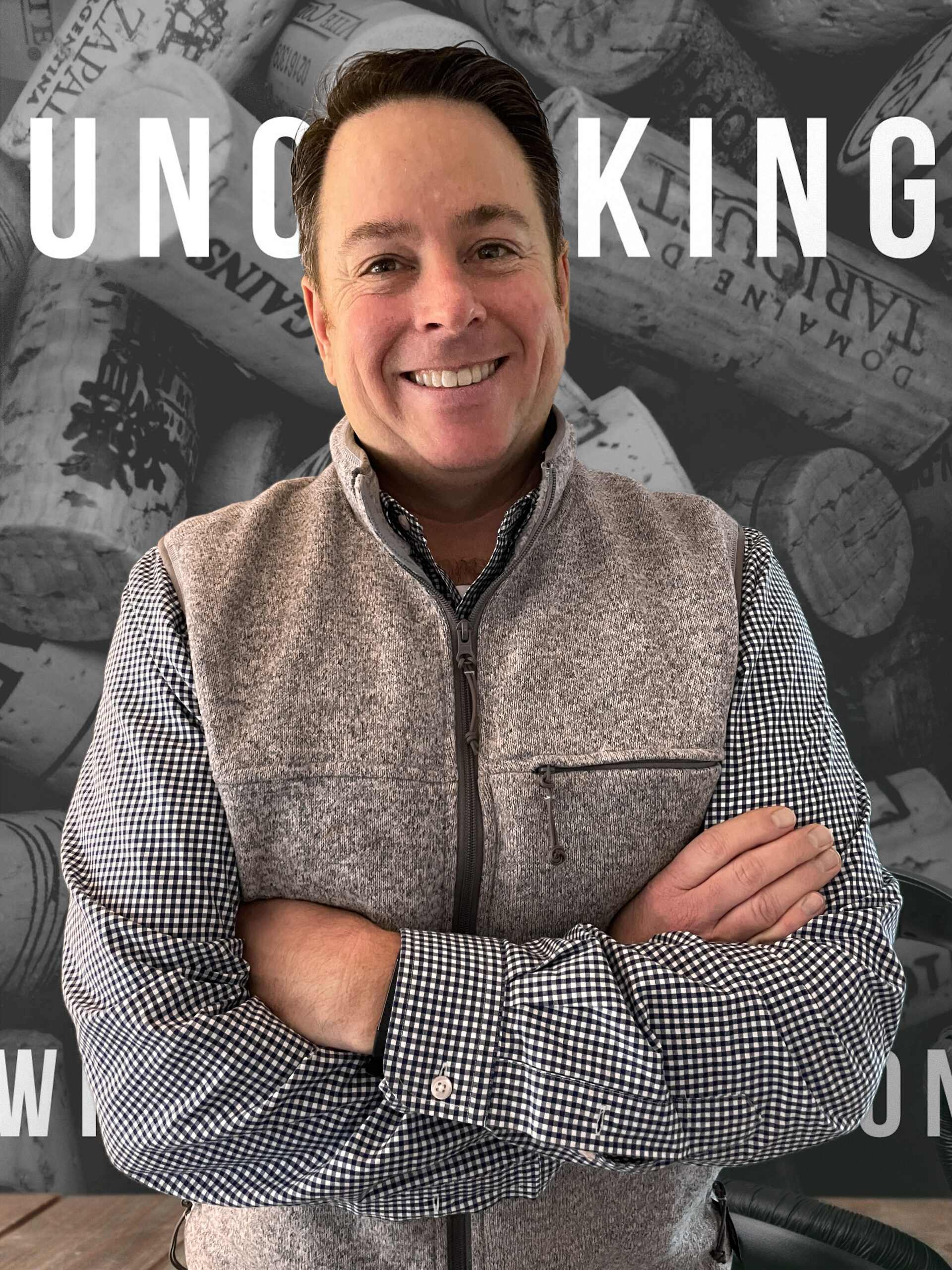
Michael Carlon is marketing professional, author, and the host of the Uncorking a Story podcast which features depth interviews with A-List authors as well as personal, motivating reflections from conversations Mike has had with the people he meets. He’s the author of the successful Farrah Graham series of books as well as stand alone novels inlcuding Return to Casa Grande, Winning Streak, and the hilarious All the F*cks I Cannot Give.
When he is not writing a novel, a magazine article, or a piece for his local newspaper, Mike earns his living as a marketing consultant traveling around the country interviewing people about their experiences with and attitudes towards his clients’ products and services. He is an expert at understanding what makes people tick and translating those insights into intelligence his clients can use to make better decisions.
Mike lives in Stamford, CT with his wife Nicole and their college-aged triplets Grace, Patrick, and Maggie. He holds a BA in Psychology from the University of Connecticut and an MBA with a concentration in marketing from Fairfield University.
